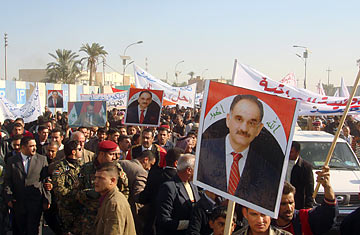
Iraqis protest in Baquba, Iraq.
For a glimmer of what Iraq might look like without Americans, take a drive east of Baghdad to Diyala province, whose mixed Sunni, Shi'ite and Kurdish population is the country in microcosm. U.S. soldiers now rarely leave their bases outside Iraq's cities and towns, leaving security on the road to Diyala largely in the hands of the Iraqi security forces. The soldiers and police who man the many checkpoints wear the latest fashion in pattern-disrupting camouflage uniforms and patches that say "Special Forces" or "SWAT." But they still rely on controversial antenna-rod bomb detectors that may in fact be useless. Their transport consists primarily of high-performance Ford trucks that break down without clean high-octane gasoline that's hard to find in Iraq. And such is the capacity of their resupply operation that they beg for water from passing foreign convoys. "They'd die out here in summer if it wasn't for us," says one American security contractor.
Baquba, the provincial capital and center of Iraq's citrus-growing region, is a largely colorless place, except for the winter orange harvest and the hundreds of campaign posters for Sunday's nationwide elections that now line the city's trash-filled streets. Still, at least the sectarian power struggle between Sunnis and Shi'ites that once raged through the city is now mostly confined to the ballot box.
Inside the fortified government headquarters, Diyala Governor Abdul-Nasser al-Mahdwe is relatively optimistic that the elections — the fourth poll since the U.S invasion brought democracy to Iraq — will go smoothly. "The country is getting better at elections," he tells TIME. "In the first, the fraud was about 40%. In the second, let's say 20%. Now it's not going to be that much at all."
But the governor worries that as the U.S. begins to withdraw its soldiers from Iraq later in the year, Iraqis could revert to settling their political disputes in the streets. "The problem is the police," he says. "The police are all local, so the local parties can manipulate them." For now, though, al-Mahdwe, who belongs to a Sunni party that opposes Prime Minister Nouri al-Maliki's Shi'ite-led governing coalition, is more worried about an élite counterterrorism unit run by Maliki's office, which he accuses of arresting scores of opposition politicians and government critics in Diyala. Two months ago, they took the deputy governor, Mohammad Hussein al-Joubouri, and nothing has been heard since about his case. "Of course it's totally political," says one of the governor's aides. "If he is really a terrorist, why didn't they arrest him before he was elected?"
Thus, democracy Iraqi-style — a little fraud, sectarianism, extralegal government intimidation and the underlying fear of violence. Iraq has by now had more practice at choosing its own leaders in relatively open elections than perhaps any other Middle Eastern country besides Israel and Lebanon. But while the Bush Administration had hoped this would create a democratic ripple effect throughout the region, the results of Iraq's elections have been less than edifying. The politicians who came to power after the country's first parliamentary elections four years ago have been unable to resolve such core issues as sharing oil revenue, balancing power between the regions and the central government, and national reconciliation.
Still, the U.S. is betting heavily that through the democratic process, Iraq's contending factions will achieve a consensus that will prevent a relapse into civil war. Under the Status of Forces Agreement concluded between the Bush Administration and the Iraqi government, all U.S. combat forces will be withdrawn from Iraq by the end of July, and the remaining support troops and training personnel will leave by the end of 2011. The Obama White House, which needs extra soldiers for its expansion of the war in Afghanistan, is committed to that timetable and optimistic about the country that they will leave behind. But on the streets of Baquba, it seems that the goal of a stable, independent and somewhat democratic Iraq has yet to be achieved.
The U.S. and its local allies have certainly made massive security gains in Diyala. The al-Qaeda-inspired insurgent groups that once rampaged through the province have been reduced to a handful of criminal cells that attempt the occasional assassination, according to Sheik Hussam al-Mojjma, head of the local Awakening Council — the Sunni citizens brigade largely responsible for defeating al-Qaeda. "When we started fighting al-Qaeda [in 2007] it was just us and the Americans," he says. "Not the army, not the police." But he isn't happy about the way he and his men were treated by the Shi'ite-dominated government once they began to disband.
Only 4,000 of the Awakening Council's 23,000 men were given jobs in the police and security forces, according to al-Mojjma. "It's all sectarian," says the sheik, whose headquarters are a concrete hut with no furniture on the eastern edge of Baquba. "The government doesn't trust us because we are Sunni. [But] if they push us any more, we are going to explode." He is particularly worried about what will happen once the U.S. pulls out of Iraq. "Iran will take us," he says. "Everyone in the region will try to occupy Iraq." But what makes the sheik even angrier is the possibility that a future government in Baghdad might turn over disputed areas of northern Diyala to the Kurdistan Regional Government, a body governing a semi-independent Kurdish enclave in northern Iraq. "If that happens, we won't even wait five seconds," he says. "We'll go to war at once."
